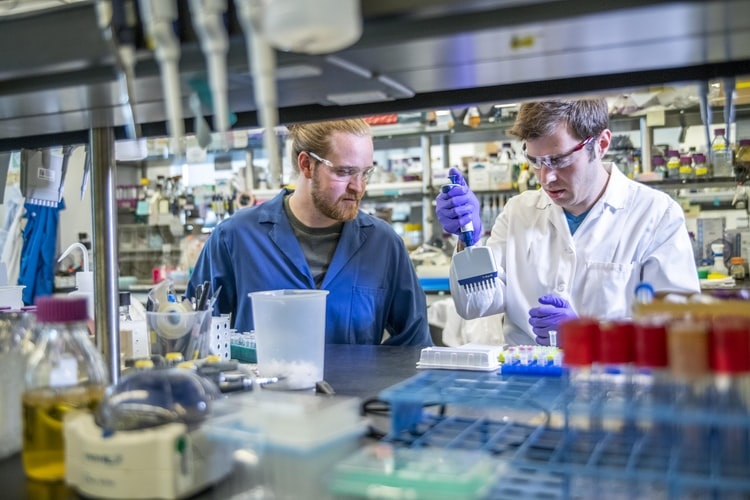The International Cannabinoid Research Society or ICRS is an organization that dedicates itself to scientific research in matters dealing with cannabinoids. The study ranges from biochemical, chemical, and psychological studies of the endogenous cannabinoid structure to the study of potential abuse of recreational cannabis.
ICRS is a non-religious and non-political organization that acts as a source of information concerning cannabis and cannabinoids. The major responsibility of ICRS is to offer an open conference, allowing researchers to come together and talk about their study.
With 30 years of research, the organization ventured beyond the U.S. to conduct symposiums about cannabis research in different places. With the ICRS going international, some of their studies over the years are presented in countries like Poland, Italy, Sweden, Scotland, Germany, Spain, and others.
Formerly, various researchers organized Symposia in the same field since 1970, but the organization was formally established in 1992. From a small number of 50 original members, the number has risen over the years, amounting to 650 total members from all over the world (ICRS, 2020).
Headed by their President, David Finn, Ph.D., the organization also gathered other board of directors who are appropriately elected or appointed Regular Members of the organization. The board is made up of the following;
1)David Finn as the President, 2) Jason B. Schechter as the Managing Director, 3) Pal Pacher as the past President, 4) Yossi Tam as the elected President, 5) Steven G. Kinsey the Treasurer, 6) Saoirse O’Sullivan the Secretary, with 7) Roger G. Pertwee as the International Secretary, 8) Stevie Britch as a trainee representative, 9) Sachin Patel, the grant P.I., 10) Stephen P.H. Alexander, the newsletter Editor, 11) W.S. Vanessa Ho the Equality, Diversity, and Inclusion Representative and 12) Heather Bradshaw as the Society Publication Liaison.
The board and the members have a Ph.D. or M.D. degree with a record of committing oneself to research related to cannabis. You can also become an emeritus member, postdoctoral member, predoctoral member, associate member, and an affiliate if you meet the organization’s standards.
Annually, ICRS Symposia are being held on a global scale. The Ph.D. Membership of ICRS represents over 40 countries, celebrating their differences, equality, and top academics (ICRS, 2020).
ICRS Mission Statement
The Mission of the ICRS is to (1) foster cannabinoid research; (2) promote the exchange of scientific information and perspectives about cannabis, the cannabinoids, and endocannabinoids through the organization of scientific meetings; (3) serve as a source of reliable information regarding the chemistry, pharmacology, therapeutic uses, toxicology and the behavioral psychological, and social effects of cannabis and its constituents, of synthetic and endogenous compounds that interact with cannabinoid receptors and of any compound that target other components of the endocannabinoid system.

CBD Research News
In an article published at Medical Cannabis Network (2020), David Finn, the President of ICRS, discussed the importance of cannabis in treating pain.
The antinociceptive characteristics found in cannabinoids present a reliable indication that suggests positive effects for different types of chronic or acute pain. However, there is still little evidence that proves clinical benefits even though there are already 35 to 45 published Randomized Control Trials or RCTs. With most of these trials mainly focusing on neuropathic pain, and reduced attention to others, such as pain inflicted by cancer, these RCTs continue to individually examine the effects of cannabinoids, cannabis, or medicines with cannabis contents in pain and acute or chronic pain patients to supply this deficiency.
Finn also claimed that nowadays, there is enough positive shred of evidence supporting the positive effects of cannabinoids for neuropathic pain. Also, even though the conducted studies are small in scope and have a brief period, the results show positive impacts on pain nonetheless. This calls for a larger scale and a more extended period of study to be conducted.
The European Pain Federation Task Force on Cannabinoids and Pain also gained the support of David Finn in considering cannabinoids or cannabis-induced medicines to be a third-line medical treatment of neuropathic pain as a separate healing remedy for other pain-related conditions. This entails that when a patient failed to be treated with first- and second-line medications, or if the side effects posed by these medicines are intolerably high, then it might be an indication to try and consider the healing benefits of cannabis-based medicines. But it is with great importance that one should be cautious in using cannabis induced medicines to patients who have been resistant to other treatments, and patients who are vulnerable to schizophrenia, psychosis, misuse or abuse of substance, and such.
Moreover, there are risks with a mostly unregulated CBD industry. Patients will be oblivious to the composition of the products they are taking, and even doctors will have no idea what’s in those products. Those things lead to hesitance in prescribing cannabis CBD or cannabinoids in general because from the beginning; they do not know what to prescribe. Essentially, CBD is a drug. It contains intricate pharmacology, which researchers do not fully understand either. It is upon humans to responsibly regulate it and have the highest possible quality of those drugs.
He also added that consumers must look for a trusted brand with high-quality products that do not contain unlisted or hidden ingredients. Ideally, medical products must undergo a process to verify the safety of it. A product must experience various trials or Phases 1, 2, and 3 before being approved by the FDA in the U.S. or HPRA in Ireland. But in reality, cannabis-based medicines are a challenge to examine because they have a complicated subject matter. Since it came from a plant or plant extract, there are complex mixtures of about a hundred different molecules. Regulatory authorities can find it very difficult to deal with them.
For that reason, even today, it is difficult to get the approval of regulatory authorities. Hence, there is a necessity for separate laboratories that focuses on examining these products to determine its contents accurately.
David Finn claimed that in pursuit of increased access to medical cannabis, the medical world should be open to considering cannabinoid medications and medical cannabis for specific patients with specific illnesses that medical cannabis can help treat. In fact, in some parts of the world, such as the U.S. and Canada, this is already happening. And from there, other countries can learn from them by noting what they did right and what went wrong.
To David Finn, there are two causes why prescriptions are not being practiced. The reason is the lack of education, and the other is clinicians not being entirely convinced by the pieces of evidence presented, especially those that discuss more complex circumstances like chronic pain and psychiatric or neurological disorders. This may also be related to the matter with education because it usually consumes a lot of time getting acquainted with the affected areas and mainly works about the pain, which is hugely multifaceted.
It is vital to carry on the support for good, high quality, basic science research in cannabis. According to David Finn, the funding and government funding, and industry funding must be continued, as it is fundamental to understanding and unveiling everything about the endogenous cannabinoid system and phytocannabinoids in the plant. Basic science research should be supported because they serve as the foundation of later clinical translation and clinical trials (Medical Cannabis Network, 2020).

News on Heather Bradshaw
Heather Bradshaw, Ph.D., currently the Society Publication Liaison of ICRS, and at the same time, directs the Bradshaw Lab of Lipid Neuroscience as an Associate Professor in the Department of Psychological and Brains Sciences at Indiana University in Bloomington. Her studies are focused thoroughly on the influence of endocannabinoids and lipid molecules on the female reproductive physiology of your nervous system (neurophysiology). Her crew is chiefly concentrated in investigating the link of disease models of endometriosis, chronic pain, and neuroinflammation to the indications of abnormal lipids in the endocannabinoid system. As the former President of ICRS, she has successfully published over sixty journal articles, and she habitually provides lectures at universities and conferences all around the globe (Green Market Report, 2020).
The International Cannabinoid Research Society continues to provide research that significantly contributes to the study of cannabis. Collaborating with other research organizations around the world, they work together to offer reviews that would help treat illness. They aim to discover unprecedented discoveries to supply the lack of proof in pieces of evidence today. These collaborations also demonstrate their support for diversity.
ICRS also aims to fully uncover the benefits of cannabis by condemning disharmony and promotes solidarity in diversity. By supporting one another during these confusing times, this scientific society thrives on building relationships and striving to establish a common good in scientific research and service to humanity. As a scientific society, they denounce racism, injustice, and inequality that destroys the human race.
For more information about their organization, you can visit https://icrs.co/, where you will find their events, contributions, and published works.

